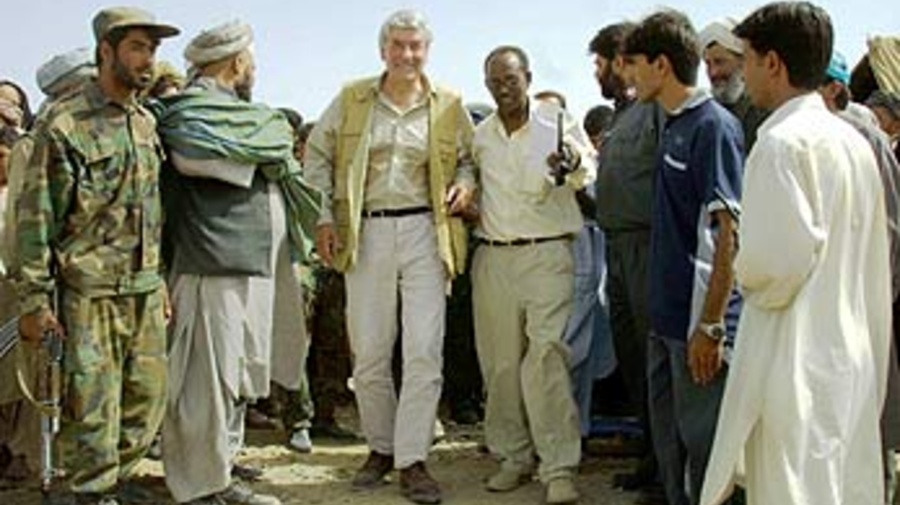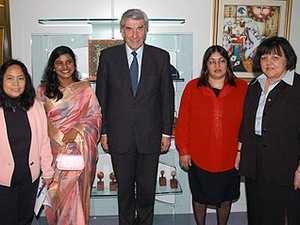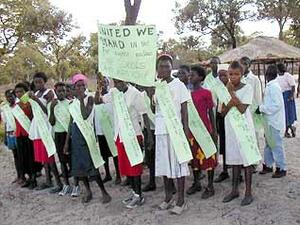Lubbers happy with returns, but worried about reintegration
Lubbers happy with returns, but worried about reintegration

UN High Commissioner for Refugees Ruud Lubbers visiting Spin Boldak camp in southern Afghanistan during his five-day mission to the country.
KABUL, August 28 (UNHCR) - UN refugee agency chief Ruud Lubbers ended his five-day visit to Afghanistan today, voicing satisfaction with the return so far of more than 1.6 million refugees, but expressing concerns that more must be done to ensure their successful reintegration.
"I would say Afghanistan has been very good on repatriation, but there's still the security point," said Lubbers, the UN High Commissioner for Refugees, at a press conference at the UNHCR office in Kabul Wednesday. "There are valuable efforts and a good beginning on reintegration, but it's still too weak."
Lubbers said more than 1.6 million Afghans have returned since UNHCR began assisting refugees to go home in March, with more than 1.4 million back from Pakistan and 170,000 from Iran. Another 10,000 refugees have returned from the Central Asian states.
"The first big return flow was due to trust in Karzai and his team," said Lubbers on the Afghans' enthusiasm to go home. "They were applauding and voting with their feet about what was happening in this country."
The UN refugee agency has been providing returning refugees with basic assistance items like plastic tarpaulins, soap and other aid. The agency also plans to provide shelter kits containing beams, doors and windows and tools so that up to 400,000 people can rebuild their homes. The UN World Food Programme provides each family with wheat flour.
There are still more than 2.5 million Afghan refugees outside the country.
The High Commissioner welcomed recent initiatives by several European countries offering special repatriation aid for thousands of Afghan asylum seekers unlikely to be granted refugee status following the fall of the Taliban regime, calling the plans so far announced by the United Kingdom and Denmark a "valuable process".
"I hope that the efforts of the Ministers of Interior in the European countries to convince a number of Afghans to return home will be accompanied by the generous funding of UNHCR to do the reintegration, because there's an obligation to help this country."
Lubbers admitted that a major challenge to his agency's effort to help Afghans home has been security incidents in some parts of the country that have forced some people to flee, particularly ethnic Pashtun communities living in some parts of northern Afghanistan.
"It is essential that there will be an improvement in the security situation," he said.
UNHCR has worked to impress upon Afghan government officials and commanders that more aid will flow their way if they can stabilise the security situation and enable those Afghans who fled since the fall of the Taliban in late 2001 to return home.
During his visit to Afghanistan, his second to the country this year, Lubbers spent two days in Kandahar province visiting displaced Afghans in the south. Many of them had fled security problems in the north, while others had escaped the effects of the south's persistent drought that has destroyed the lives of people in rural communities and devastated vast herds of livestock belonging to the country's Kuchi nomads.
The High Commissioner said UNHCR supported a commission on returns established by Afghan President Hamid Karzai, whom he met on Sunday. This commission would help address security concerns among some groups who fled the north and work to facilitate their eventual reintegration. Lubbers added that he wanted to see an improvement in security so that all Afghans can return home.
"They make promises," said the High Commissioner of the commitments the humanitarian community gets from local commanders in the strife-affected areas, "but we monitor the progress ourselves as UNHCR."
Lubbers plans to brief donor countries about the situation in Afghanistan and the outlook for repatriation in 2003 at his agency's annual meeting in September.






